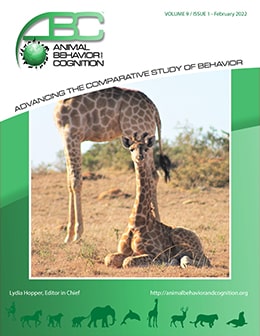Vol 9, Issue 1, February 2022
Are the More Flexible Great-Tailed Grackles Also Better at Behavioral Inhibition?
Citation
Logan, C. J., McCune, K. B., MacPherson, M., Johnson-Ulrich, Z., Rowney, C., Seitz, B., Blaisdell, A. P., Deffner, D., Wascher, C. A. F. (2022). Are the more flexible individuals also better at inhibition? Animal Behavior and Cognition, 9(1), 14-36. https://doi.org/10.26451/abc.09.01.03.2022
Abstract
Behavioral flexibility should, theoretically, be positively related to behavioral inhibition because one should need to inhibit a previously learned behavior to change their behavior when the task changes (flexibility). However, several investigations show no or mixed support of this hypothesis, which challenges the assumption that inhibition is involved in making flexible decisions. We tested the hypothesis that flexibility (reversal learning and solution switching on a multi-access box by Logan et al., 2022) is associated with inhibition (go/no go on a touchscreen and detour) by measuring all variables in the same individuals. Because touchscreen experiments had never been conducted in this species, we validated that they are functional for wild-caught grackles who learned to use it and completed go/no go on it. Performance on go/no go and detour tasks did not correlate, indicating they did not measure the same trait. Individuals who were faster to reverse took more time to attempt a new option on the multi-access box and were either faster or slower at go/no go depending on whether one individual, Taquito (accidentally tested beyond 200 trial cap), was included in the GLM. While the relationship between trials to reverse and trials to pass go/no go was strongly influenced by Taquito, the more comprehensive Bayesian flexibility model supported the positive relationship irrespective of whether Taquito was included. Performance on detour did not correlate with either flexibility measure, suggesting that they may measure separate traits. We conclude that flexibility is associated with certain types of inhibition, but not others, in great-tailed grackles.
Keywords
Behavioral flexibility, Behavioral inhibition, Go/no go, Detour, Birds, Grackles
